Skiathos: Greek gods’ gift to Hades-like August travel
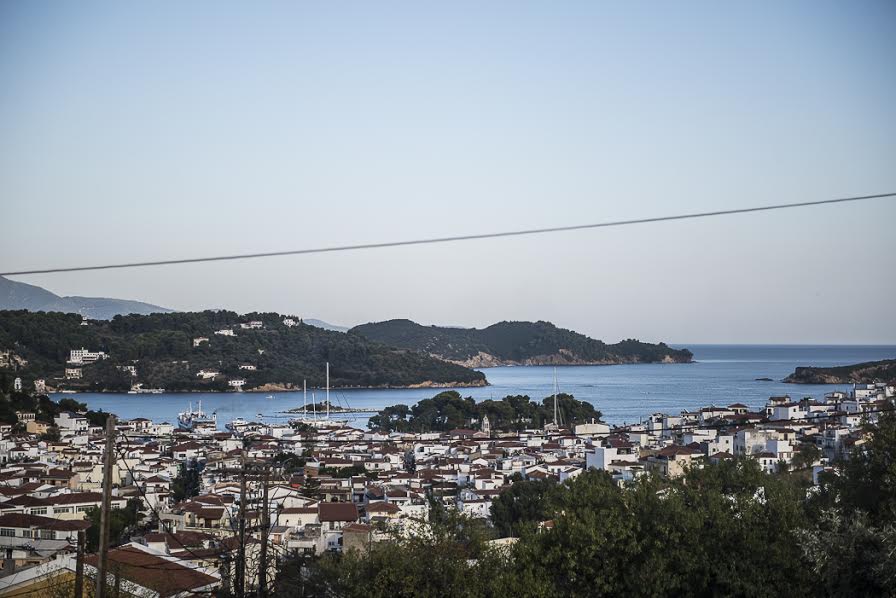
SKIATHOS, Greece — When I was very little, my mom read me stories to bed. They weren’t “Dr. Seuss” or “Winnie the Pooh” or anything so mundane. Even at age 5 I was into adventure with a hefty dose of sex and violence. Thus, she read me Greek mythology. By the time I entered elementary school, I knew the name of every Greek god from A (Aphrodite, goddess of love) to Z (Zeus, god of gods). In the playground during recess, I regaled friends with stories about minotaurs and Achilles and The Odyssey. They respected my comparison of our first-grade teacher to Medusa. I couldn’t explain how Uranus, the god of sky, fathered 12 children with his mom, Gaia (goddess of earth). That came later. But before I ever discovered Wilt Chamberlain and Hunter Thompson, my first hero was Bacchus, the god of wine.
The impressions of a young boy last a lifetime. Maybe it’s why, besides acquiring a healthy addiction to vino, until I moved to Italy, Greece was my favorite country.
I just returned from a week on the gorgeous isle of Skiathos which I lovingly placed on the high pile of fantastic experiences I’ve had all over Greece. I once hitchhiked from the commercial center of Thessaloniki in the north to Athens, living off hot, buttered bread out of bakeries every morning. I stood in the starting blocks in Olympia where the first ancient Olympics were held in 776 B.C. I dodged broken plates smashed around me while I danced at a chestnut festival in Crete. I wrote a travel story sitting under the same tree on Kos where a local doctor named Hippocrates wrote the Hippocratic oath in the 5th century B.C. I’ve also been to Santorini (most romantic), Mykonos (best nightlife), Naxos (best beach) and Lipsi (most traditional). Greece has 6,000 islands. Each one has its own history, its own draw, its own vibe.
Traveling in Greece gave me my definition of freedom: Freedom is deciding what Greek island you want to go to on your way to a boat dock.
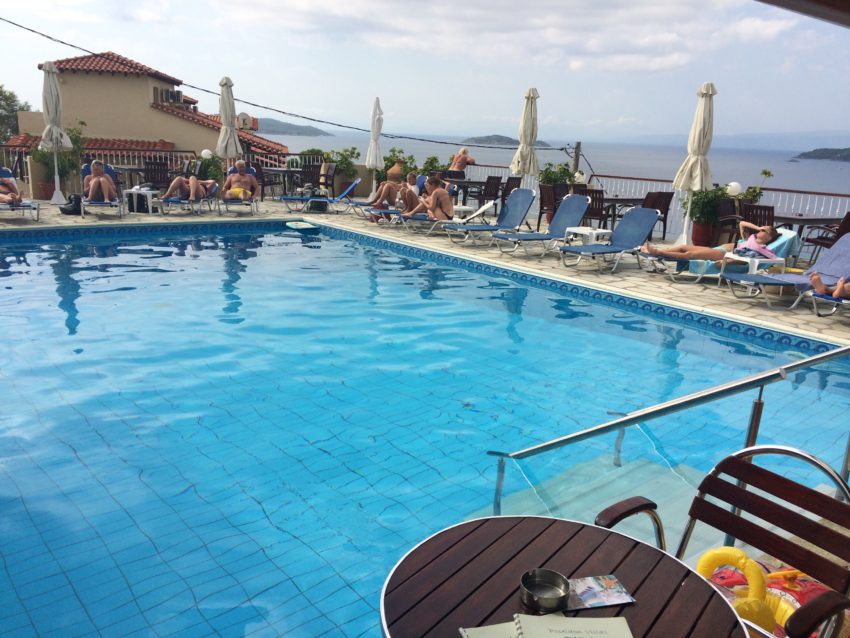
You can do that in Greece. I didn’t do that on this trip. I took one look at my hotel in Skiathos and had a hard time imagining sleeping anywhere else. Besides, traveling to Greece in August is problematic. It’s bulging with backpackers, partiers, lovers, historians, sun worshippers and shoppers. Zeus would not approve.
But, unlike Greece’s beauty, Zeus is just a myth.
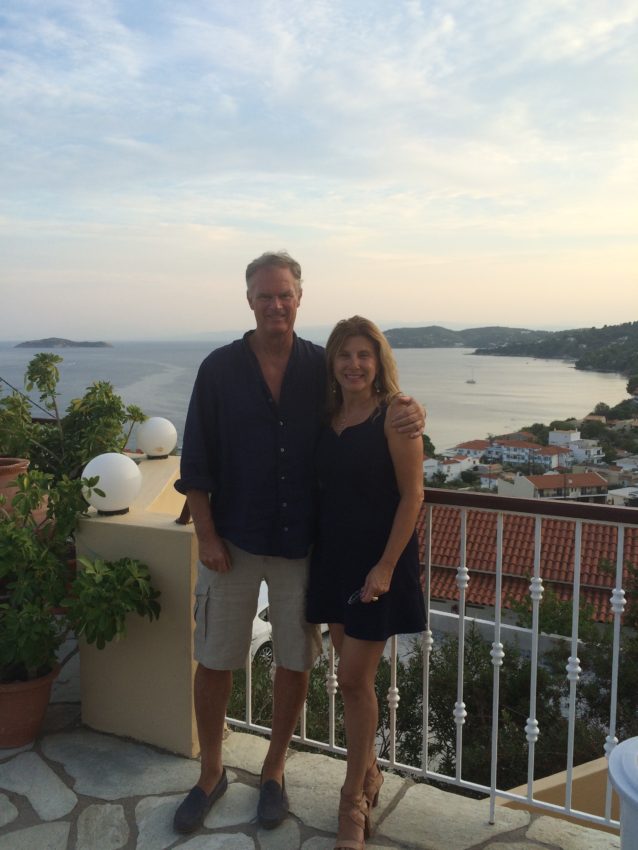
I went with my girlfriend, Marina, whom, ironically, I often compare to a Greek goddess. Like nearly every other Italian, she gets three weeks off in August. It’s one reason Rome is again as empty as after the fall of the Roman Empire. It’s also why in Skiathos we heard as much Italian as we heard Greek.
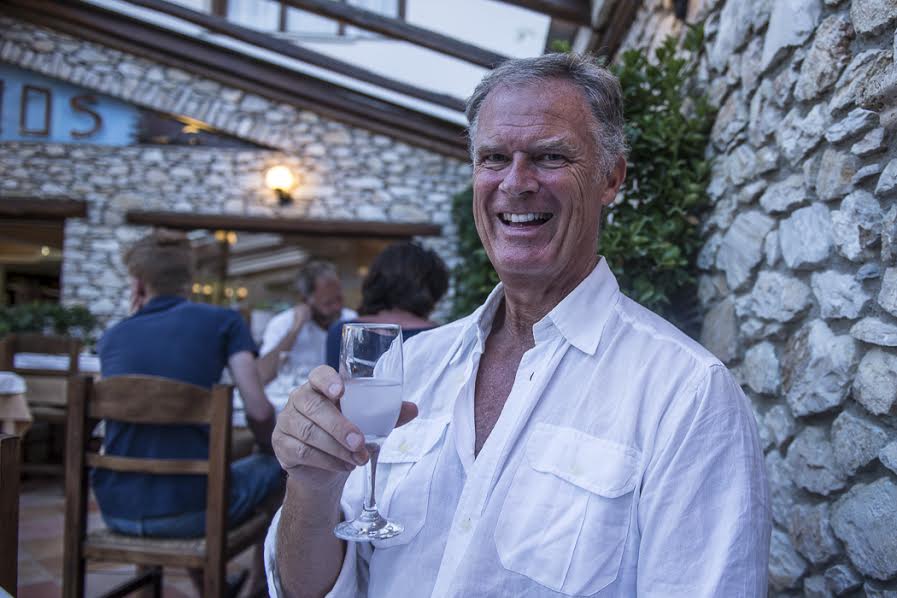
However, July and August in Greece offer near perfect weather. Every day was low 80s with rarely a cloud in the sky. That’s not guaranteed the rest of the year. I was in Crete one October when daily rainstorms turned me into a backgammon savant with the old, perplexed Greek men in the local taverna. It’s where I also developed an unhealthy dependency on ouzo, Greece’s addictive, licorice-flavored aperitif that sucked me back in last week like a reformed junkie locked in a meth lab.

But here’s a tip on traveling in high season: Get a great hotel. Find a quiet, relaxing pleasure palace that feels away from it all even if it’s a pitching wedge from a store selling Zeus boxer shorts. Our Poseidon Villas are something out of Venus’ wildest sexual fantasy. They are two cream-colored, buildings with red-tile roofs straddling a narrow alley high above little Skiathos Town (pop. 5,000). A glorious, three-meter-deep swimming pool is surrounded by deck chairs and tables illuminated by romantic lighting. A pool-side bar serves up ouzo on the rocks and ice-cold beer at reasonable prices. The pool and our balcony overlooked a blanket of red-tile roofs leading down to the royal blue Aegean Sea. Before the sun set, the water glistened like silver graffiti floating in the wind. I’ve had fantastic hotel views during my travels. Ipanema Beach in Rio. The Matterhorn in Zermatt, Switzerland. The skyline in Vancouver.
No hotel view ever matched eating breakfast on our balcony overlooking the Aegean.
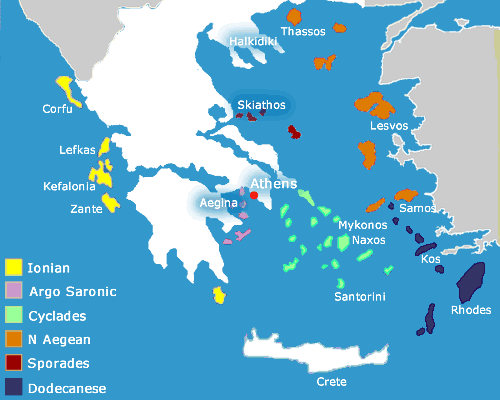
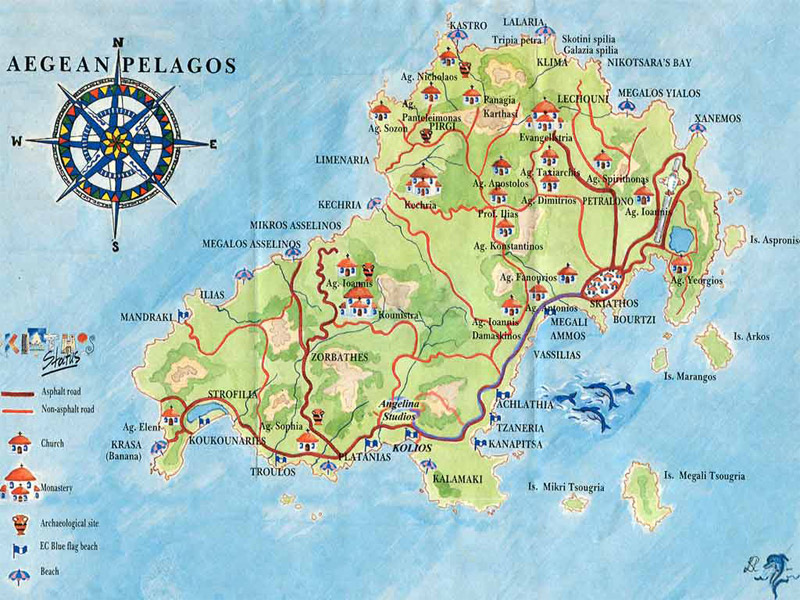
The added bonus is Skiathos is ridiculously easy to reach. It is a 90-minute flight from Rome and located about 90 miles north of Athens in the Sporades island chain. The Poseidon Villas are five minutes from the airport. We left Rome at 6:30 a.m. and we were poolside in Greece by 9.
Skiathos is only 50 square miles, just a sand castle larger than Nantucket. Shaped like an elephant sitting on its hind quarters, Skiathos has 65 beaches scattered around dozens of bays, inlets and coves. Deciding what Greek island you want to go to on your way to a boat dock?
In Skiathos, we decided what Greek beach we wanted to go to on our way to a bus stop.
Down the hill from our hotel, we took one of the buses that come every 15 minutes to haul people along the southern end of the island. You can decide on the beach from your view from the road — if you can see through the forest of arms, heads and beach bags that fill each bus. We heard a steady stream of Italian, English from most British economic classes and a smattering of Russian and German. Every bus had a quiet, unassuming pod of blonde, blue-eyed Swedes, like puppies in the back of a car. About the only Greeks were the exasperated ticket takers trying to collect 1.60 or 2 euros from each boarding passenger.
Skiathos beaches aren’t like those in the Caribbean. Instead of palm trees, they’re lined with pine forests. The Aegean is more royal blue or cobalt than turquoise. The beaches are more narrow, the sand more gold than sugary white. While rocky beaches do exist, beaches listed as “sandy” are as pure and comfortable as any in the world. Rocks are nowhere to be found.
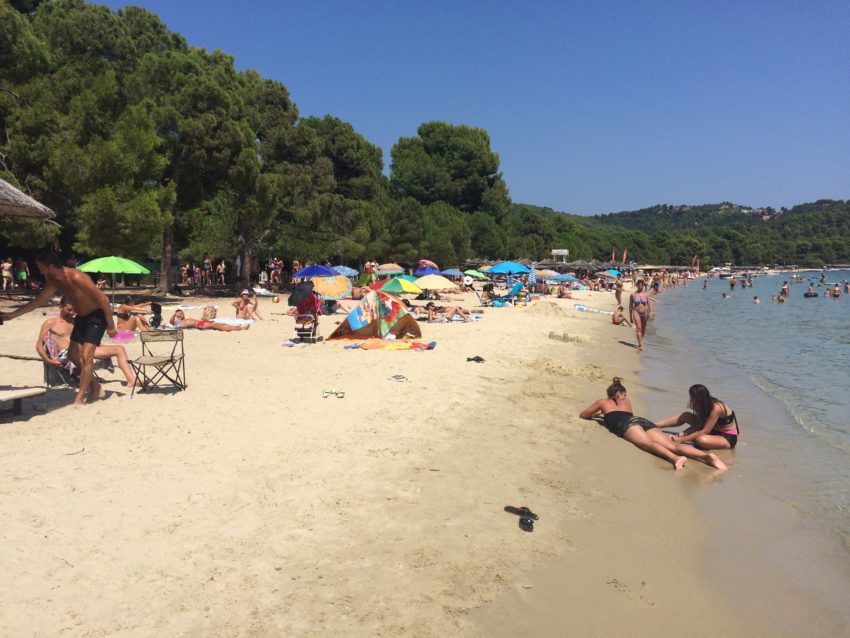
The main beach is Koukounaries, the last stop on the bus line about 20 minutes from Skiathos Town. It’s about a half-mile stretch of sand lined with multi-striped umbrellas shading lounge chairs that go for 4 euros a pop. This is the commercial center of Skiathos’ beach life. Dominating one section of beach is a consortium renting all kinds of acqua sports, including speedboats dragging people sprawled on giant, round rafts that look like floating monster truck tires. Top 40 hits play on a loudspeaker. The beach was lined, cheek to cheek, literally, with people on lounge chairs.
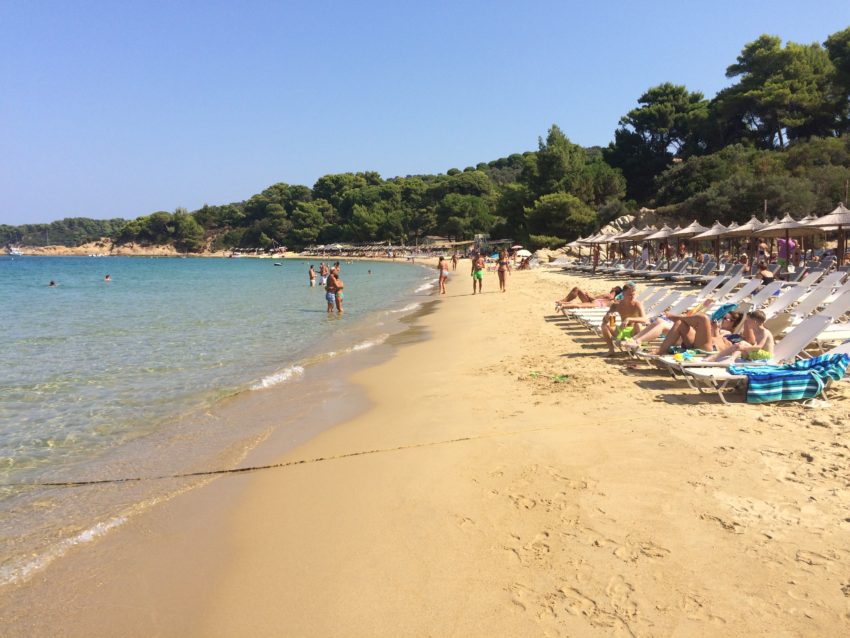
One day we left the bus stop and walked up and down a steep hill to Big Banana Beach occupying the tip of the southwest corner of the island. It was slightly smaller, a little less crowded and featured luxury lounge chairs equipped with thatched umbrellas and small tables with iced buckets of water. A good, cheap restaurant served monster Greek salads high above the beach for great sea views through the pine trees.
While Skiathos sometimes felt like the Jersey Shore in the ‘60s, walking into the water meant a step back into Ancient Greece. The water was so clear I could see little fish swimming around my ankles as I waded out 100 meters before the sea went over my head. The water temperature was low ‘80s, cool enough to wash away the sweat but not so cold you risk sterility. The Aegean Sea was a suitable backdrop for the Greek gods’ life of lustful luxury.

The best beach on Skiathos, and one of the best I’ve seen in Greece, is Kolios. It’s located in a secluded cove about halfway down the bus line, or Bus Stop No. 14 as they refer to the landmarks. The cove is only about 400 meters and lined with pine trees. The number of lanais chairs is limited but so are the crowds and noise. The only sounds were a smattering of polite adult conversation, the ocean languidly lapping against the shore and the soft melodic sounds of Greek singers Nikos Papazoglou and Sokratis Malamas from the great seafood restaurant on the beach. Change that definition of freedom.
Freedom is deciding what Greek island you want to go to on your way to a boat dock — then spending an afternoon on a beach like this.
Freedom is a Skiathos theme that goes back 2,500 years. In 480 B.C., the fleet of the Persian king Xerxes crashed on the rocks off Skiathos’ coast. Greeks used the ensuing repair time to block the seas and prevent the Persians from invading and supplying their armies facing the 300 Spartans. (Remember the really bad movie, “300”?) The Spartans wound up defeating the Persians at Thermopylae. In 1704, the freshly built Evangelistria Monastery in the north provided a hideout for rebels during the Greek War of Independence.
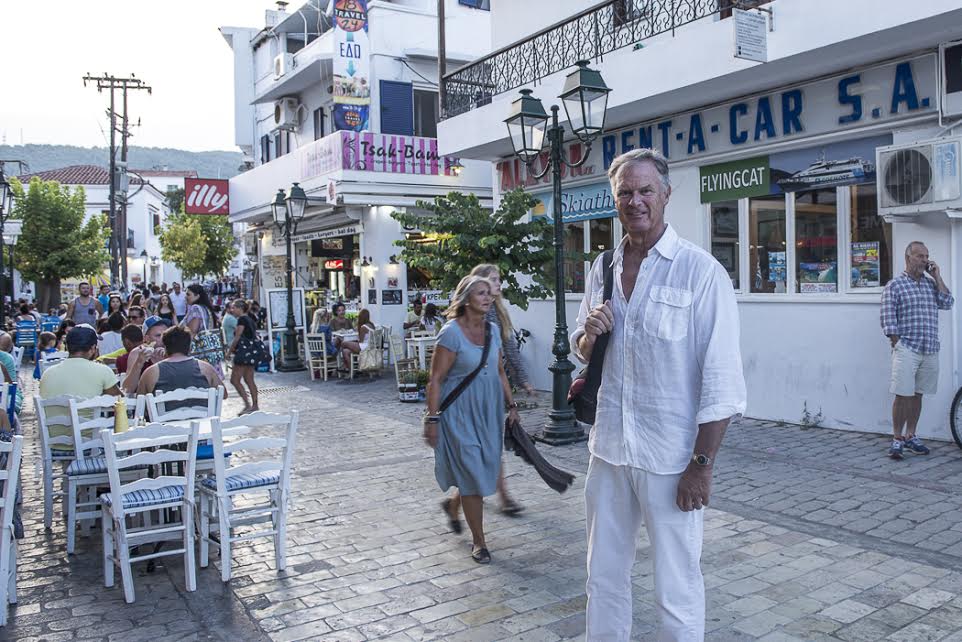
Today the island’s main bus road is lined with hotels and tasteful resorts while Skiathos Town is a combination Greek theme park and souvlaki stand. The main walking mall of Papadiamanti, stretching from the bus road to the port, is 700 meters of souvenir stands, restaurants, bars, ice cream shops, jewelry stores, boutiques, cafes, grocery stores, rental agencies and a gross place where tiny fish clean the dead skin off your feet.
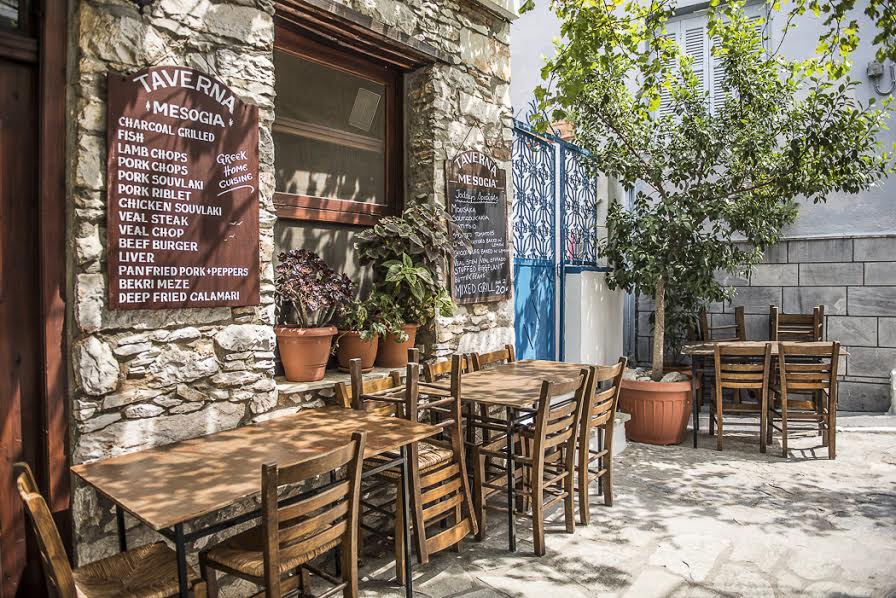
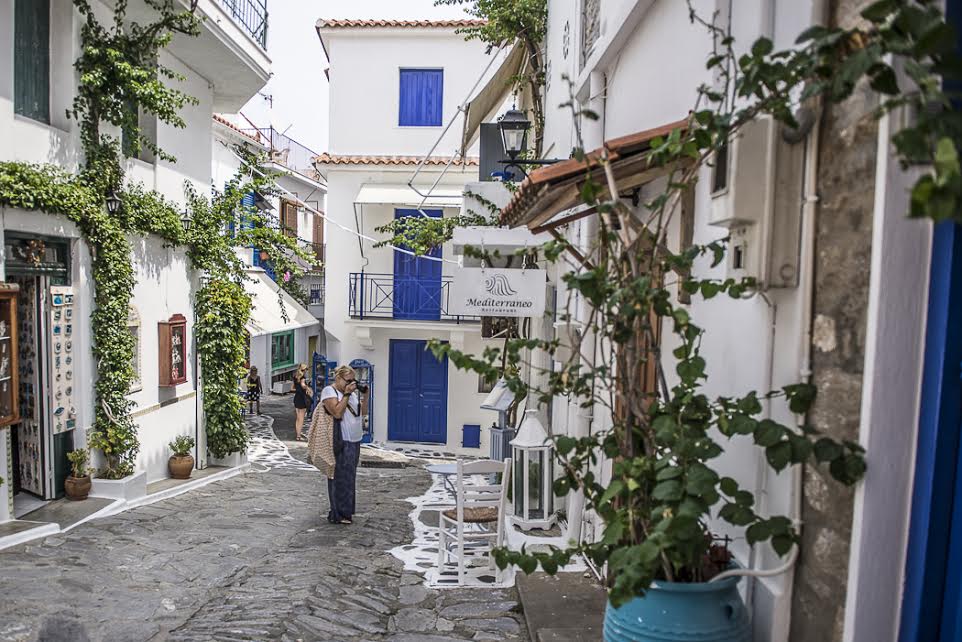
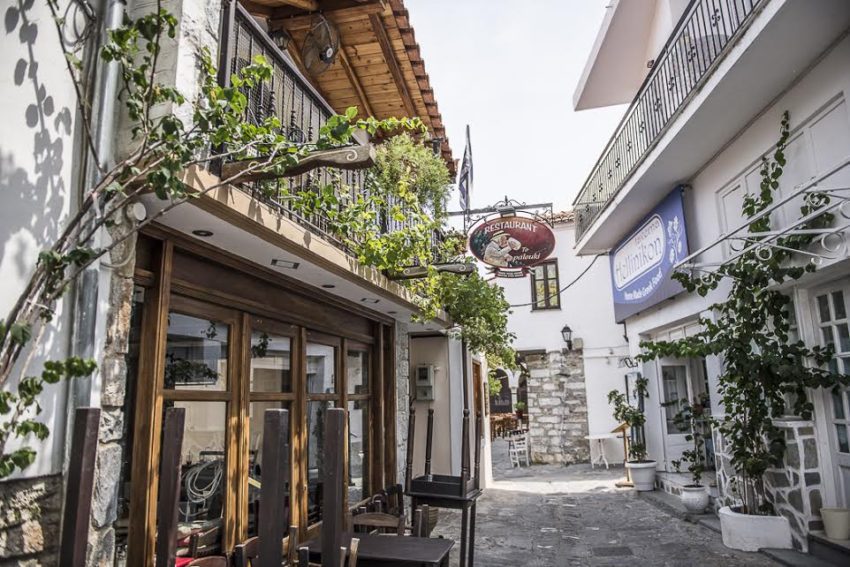
But get off Papadiamanti and the windy alleys snaking off the port offer a glimpse into true Greek life. Men in fishing caps talk on stoops offering a “Yasas!” (Hello!) to passersby. Old women dressed in all black putter along carrying grocery bags. A teenage girl leaves a ground-floor apartment in designer jeans carrying a beach bag heading to her favorite local hideaway.
These windy paths were about our only access to seeing Greeks. Other than bartenders and waiters, I didn’t see them in the main roads, on the buses, on the beaches. I didn’t need many interviews to figure it out. The Greek crisis that dominated headlines from the business page to the front page in recent years remains alive and well. Remember, this is the country that had a 323-billion euro debt and became the first developed country to fail to repay a loan to the International Monetary Fund. From 2010-16, the Greek landscape was peppered with local riots and nationwide protests. It all started with the introduction of the euro in 2002. It’s 14 years later and the average Greek, particular small-town Greeks in places like Skiathos, are struggling even more than Italians.
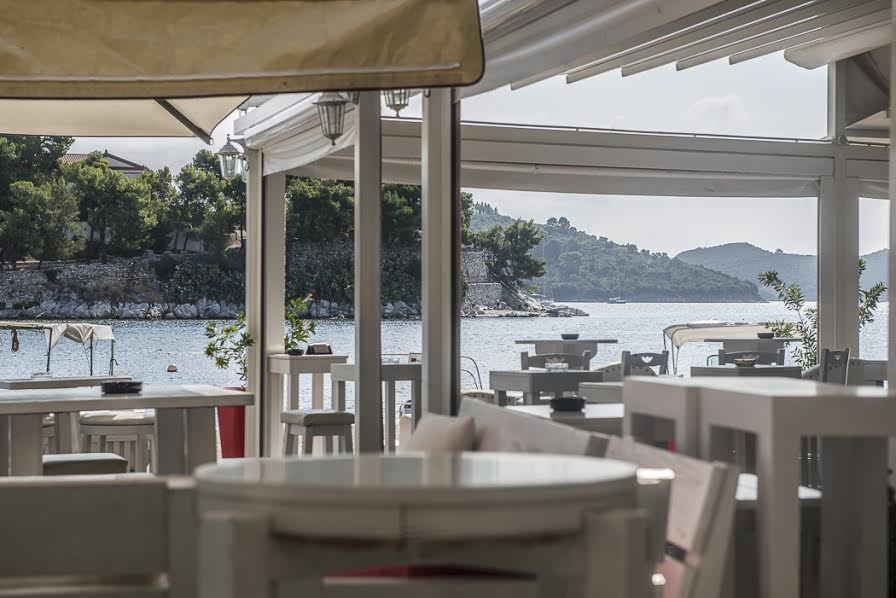
During a real slow morning after Marina and I walked hand in hand along the quiet old port, we stopped for a coffee at The View, a real comfortable port-side bar with cushioned benches looking out at the sea. It was empty. The bartender, Vasilis, was in his late 20s, tall, lean with a neat moustache and a ready smile. Like many people here dependent on tourism, Vasilis spoke excellent English. We chatted a bit about Greek soccer and Kostas Manolas, the Greek star for our beloved A.S. Roma which Vasilis and I both had in common. I then asked him why I see so few Greeks in Skiathos. He said they can’t afford it.
“Greece,” he said, “is shit.”
He said of Greece’s 6 million people, 4 million are poor.
“Greeks don’t have enough money to buy things, to go out, to travel,” he said. “They only have enough money for food.”
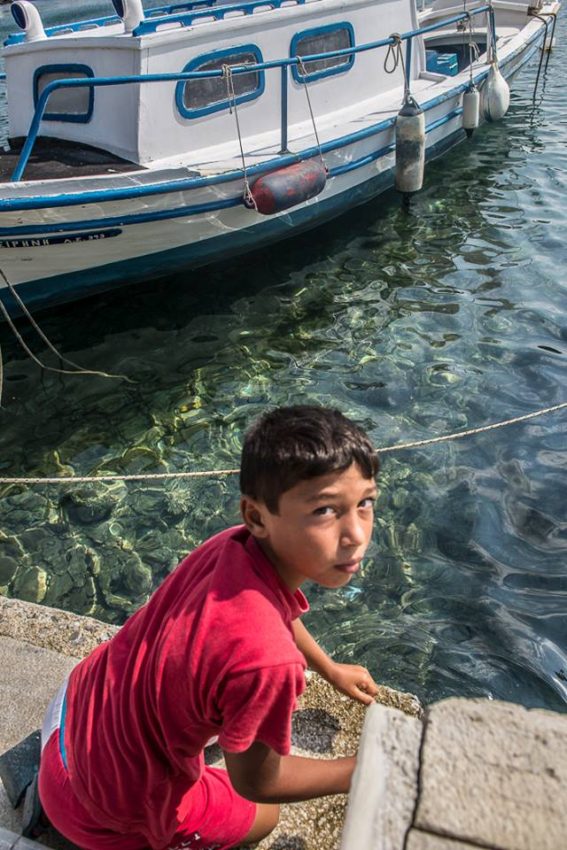
He said many of his friends went to university and studied economics. When they graduated they had no job. They’re all working as barmen. I asked what he was doing here.
“I studied economics,” he said. “Now I work as a barman.”
But Greece is also Southern Europe. The Italians seem to rise above their growing financial crisis by concentrating on family and friends, food and wine. The Greeks, he said, are similar but he mentioned another motivation that I’ve heard about Italians.
“Greeks are strange,” he said. “They don’t care. They don’t try to move up.”
“In Italy,” I told him, “about 75 percent of all business are family run. People know what they’re going to do by the time they’re in high school.”
“Greece is the same,” he said. “My friend’s father has a small clothes store. My friend studied economics. Now he works in the clothes store.”
In a sick and very selfish way, financial crises benefit travelers. Skiathos, surprisingly, is pretty cheap. Liters of water were 1 euro. A draft beer 2 euros. Uozo on the rocks 3. We had dinners in fine restaurants, including ouzo, wine, appetizers, main dish and dessert (often thrown in by the kind restaurant managers) for rarely more than 35 euros.
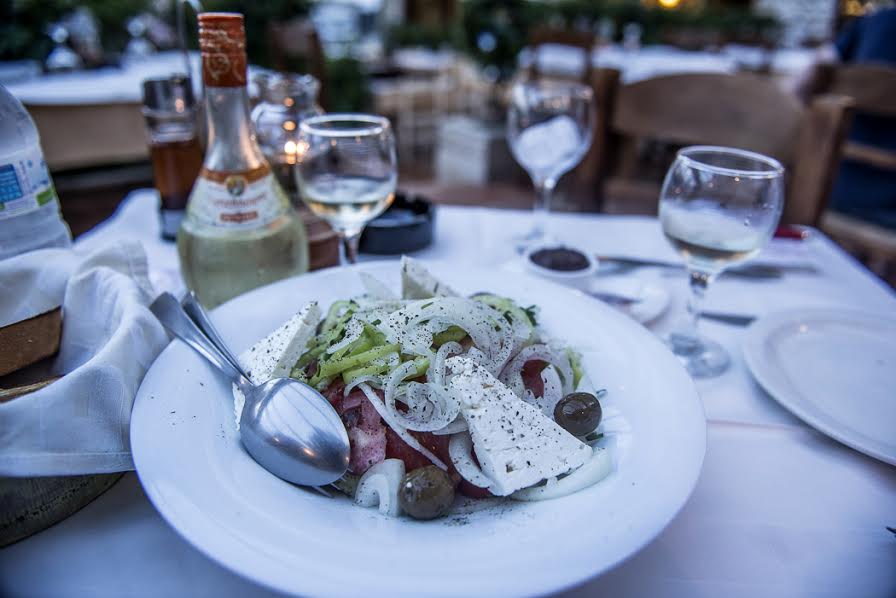
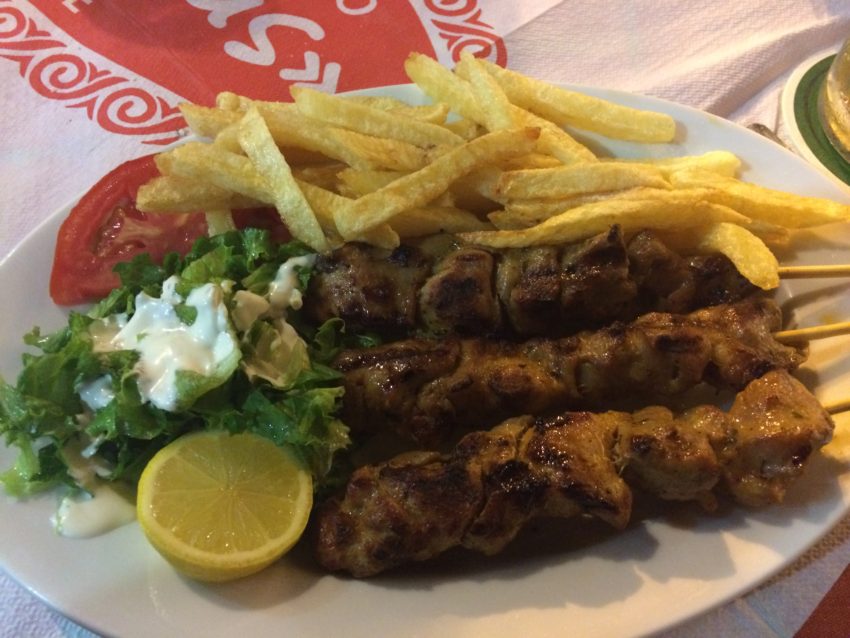
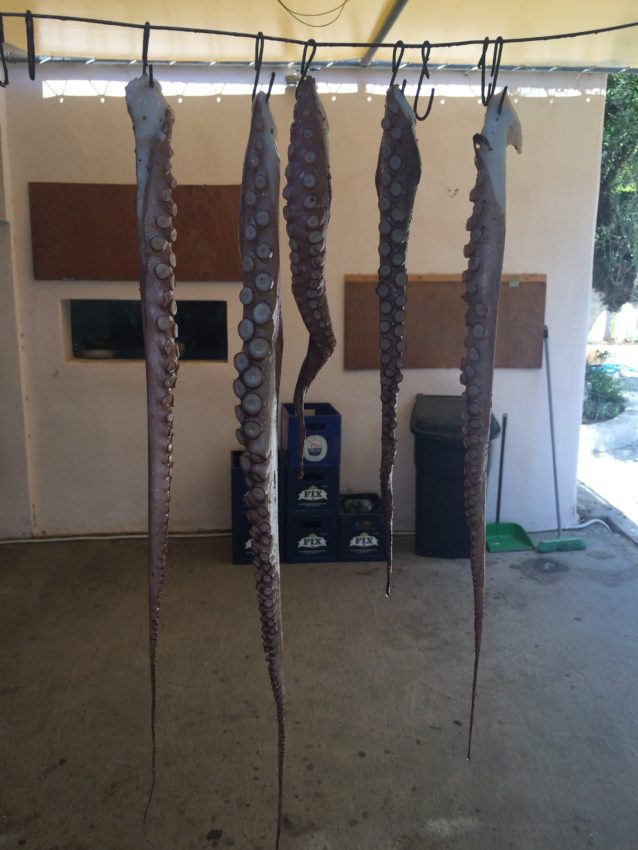
The food was nothing short of spectacular every day. For eight years I wrote a traveling food column for The Denver Post and the first one I wrote in 2004 during a pre-Olympic trip to Athens was how the Greek cuisine was healthier than the Atkins Diet. Greek food is the opposite of the low-carb, high-protein Atkins Diet that sucked in 60 million Americans. Greek food is slow roasted meats — lamb, chicken and pork — fila bread, cinnamon and nutmeg, mushrooms, bell peppers and onions, cheese, rice and, the star of the Greek taverna from Crete to Thessaloniki, the Greek salad. It’s tomatoes, kalamata olives, onions, cucumbers and bell peppers topped with a big slab of feta cheese and sprinkled with oregano then oil and vinegar. (Note to all Greek restaurants in the U.S: Stop serving your salads with lettuce. Greeks think that’s the equivalent of putting catsup on filet mignon. So do I.)
It’s healthy, cheap and, in Skiathos’ great collection of restaurants, a major part of the Greek experience.

Three meals stood out. Our first night we went to Asprolithos, recommended by our hotel bartender and not found in any guidebook. An open-air restaurant lined with plants and candles on every table, I ordered agnello kleftiko: lamb, white wine, herbs, garlic and cheeses all wrapped in a flaky filo crust. At Kolios Seafood on Kolios Beach, we walked under octopus legs drying on a line to order fresh octopus and grilled calamari. The calamari (squid) was thick, juicy and the perfect accompaniment to one of the best seaside views in Southern Europe. Then we had our standby taverna on the corner opposite the bus stop, Alexandros. It was just one of dozens of little eateries in Skiathos that served up great grilled chicken and lamb souvlaki which fell off the skewer with a shake of the wrist. Two souvlakis, a Greek salad and an ice-cold draft beer (A note to American taverns: Take a tip from Skiathos and store your mugs in the freezer. They make the beer that much colder) was about 10 euros.
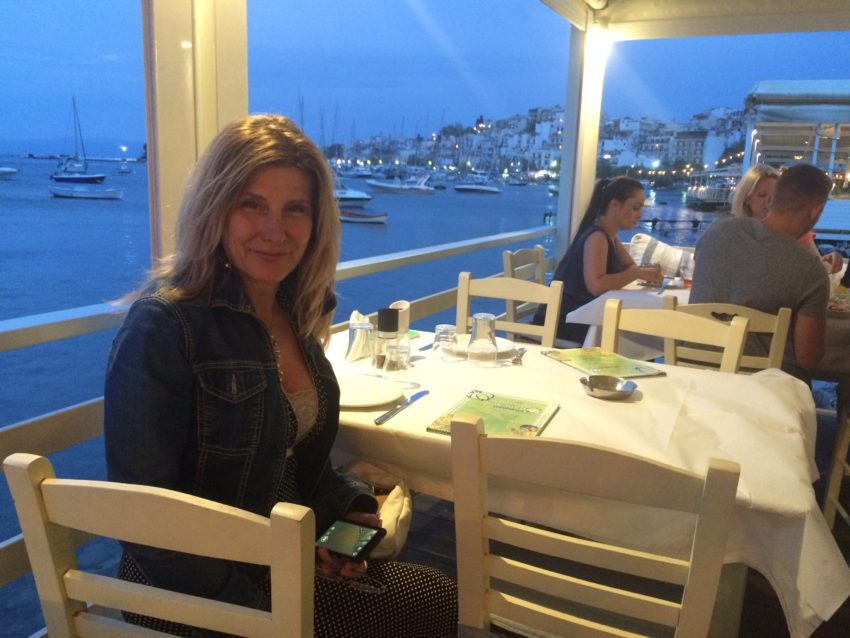
Of course, traveling to Greece in August has its drawbacks. All the cars and scooters were booked, leaving us stuck on the south end of the island. The buses returning from the beach were so packed one day, we couldn’t board. We found a family of Serbs who had a Greek friend with a son who drove a cab. We rode back in his taxi packed with Serbs and Marina on my lap.
However, I probably gained back the two kilos I lost in the hot Rome summer and I have a tan right off a Coppertone ad. If I was any more tranquillo, I’d have to pour myself onto my writing desk. In Greek mythology, Zeus was the god of all creation. He could’ve created the Greek Islands and then stopped.
He would have already served mankind well.


August 28, 2016 @ 1:34 pm
Jhon what a great trip, thank you for all the information. Someday I’ll go back to Greece. congratulations you look very happy. See you soon in Rome.
August 28, 2016 @ 11:08 pm
Thanks, Cintia. Yes, Marina is a great photographer. I’ll pass along your comments.
August 28, 2016 @ 6:03 pm
Beautiful photos. I definitely need to go back to Greece!
August 31, 2016 @ 12:36 pm
Well done I am starving for the food and incredible locale!!
BR Martino
August 31, 2016 @ 11:50 pm
Go soon, Marty. The weather turns ugly fast in Greece.
June 7, 2019 @ 2:43 am
A Greek travel tale to suit my tastes except for the promise of fast turning ugly Greek weather! From Sept to July? Doesn’t indicate room for recommendation. Worse points being fighting for room to stand on a bus back from a beach in high season or the bad weather in the “off” season.
June 7, 2019 @ 3:26 am
Don’t go to Greece in the off season unless you’re Heavily into backgammon.
June 18, 2023 @ 3:30 pm
What a wonderful read.
Just arrived in Skiathos and I found this gem.